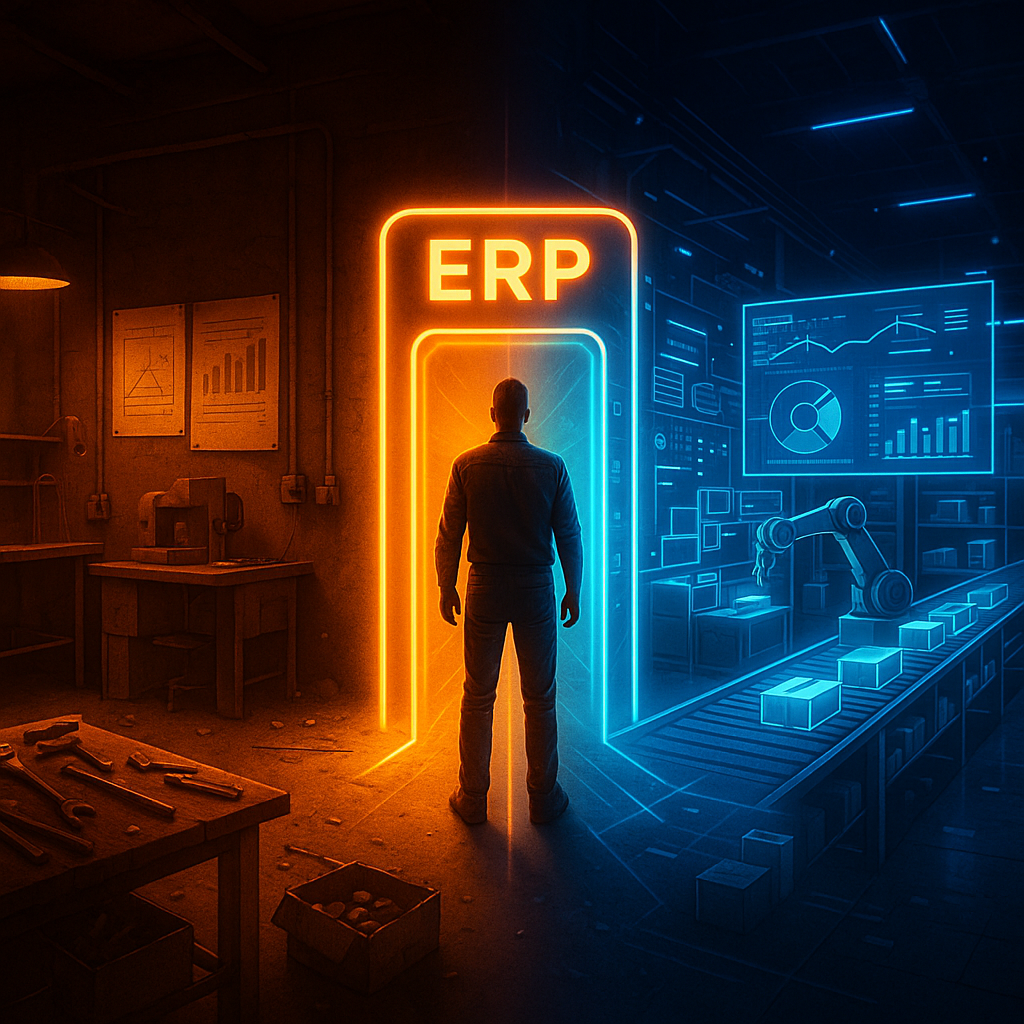Manufacturing companies face constant pressure to reduce waste, shorten lead times, and meet rising quality standards. Disconnected systems and manual processes drag down efficiency, stall production, and increase the risk of costly errors.
Enterprise resource planning (ERP) software centralizes production, inventory, finance, and quality data. It eliminates silos, improves traceability, and helps operations teams make faster, data-backed decisions. Whether you're running a mid-sized shop or a global plant, the right manufacturing ERP software solution can transform your business processes. In fact, manufacturing companies account for the largest share of ERP adoption, making up 47% of all ERP software users, according to Technology Evaluation Centers.
This guide covers what ERP does, why it's different from older systems like MRP, and how to choose an ERP platform built for manufacturers.
TL;DR:
A manufacturing ERP system connects inventory, production, finance, and compliance in one unified platform. It reduces manual work, improves visibility, and helps manufacturers respond faster to real-world demands.
What Does a Manufacturing ERP System Do?
Connecting Production, Inventory, Finance, and More
ERP systems connect every part of the manufacturing business, production, inventory, finance, quality, and scheduling, all into a single, unified platform. Centralizing operations reduces errors, shortens lead times, and improves decision-making by giving teams access to accurate, real-time data across all operations.
Replacing MRP with Integrated ERP Systems
Traditional MRP systems focused only on materials and scheduling. They couldn’t support financial tracking, quality control, or supply chain issues. ERP platforms offer a complete solution that automates routine tasks, flags risks early, and keeps the entire operation synchronized, from procurement to the shop floor. Manual data entry, late orders, missing inventory, and production delays cost manufacturers time and revenue. ERP solves these issues by giving teams full visibility and tighter control.
Key Features of Manufacturing ERP: What You Should Expect
Real-Time Visibility Into Materials and Stock
A manufacturing ERP system provides real-time tracking of raw materials, work-in-progress, and finished goods across the supply chain. Accurate inventory management helps reduce overstocking, prevent shortages, and improve warehouse efficiency. ERP software aligns materials planning with actual production needs.
Production and Scheduling Tools That Cut Downtime
ERP software automates job scheduling, tracks machine use, and balances workloads across production lines. It reduces bottlenecks, supports just-in-time workflows, and improves shop floor control. The result is a production process that moves with fewer delays and better resource use in your manufacturing operations.
Finance, Quality Control, and Compliance Built In
Manufacturing ERP platforms connect accounting with production to show real product costs. Quality control features monitor inspections and traceability throughout the workflow. ERP systems help manufacturers stay compliant without juggling multiple tools or manual reports.
Benefits of Manufacturing ERP: How It Makes Your Business Competitive
Faster Response to Demand Changes
ERP systems help manufacturers adjust quickly to order shifts, supply issues, or machine downtime. Real-time production data and integrated forecasting tools make it easier to respond without overproducing or stalling operations. Fast, data-backed decisions keep production aligned with market needs.
Fewer Delays and Less Manual Work
ERP software automates core business functions, from order entry to inventory updates and production tracking. Automation removes delays caused by paperwork, handoffs, and missing data. Operations move faster because information flows instantly across departments.
Real-Time Data for Faster Decisions
Manufacturing ERP systems give operations leaders full visibility into the shop floor, production schedules, costs, and supplier performance. They can make proactive adjustments before small issues impact delivery or margins. With current data at their fingertips, teams make decisions with speed and accuracy.
ERP Deployment Options for Manufacturing Businesses
Cloud ERP for Flexible, Scalable Operations
Cloud-based ERP systems reduce IT costs, deploy faster, and scale easily. For manufacturers with multiple plants or remote teams, cloud ERP offers real-time coordination, fewer system breakdowns, and automatic updates.
Ideal for:
- Multi-location manufacturing businesses
- Teams with limited internal IT resources
- Companies that need rapid deployment and updates
On-Premise ERP for Full Control and Customization
On-premise ERP runs on internal servers and suits manufacturers with strict data control or complex legacy systems. It offers full customization and tighter integration with existing infrastructure. The trade-off is higher upfront investment and maintenance costs.
Ideal for:
- Regulated industries requiring on-site data control
- Manufacturers with complex, legacy workflows
- Companies with strong in-house IT teams
Hybrid ERP for Complex Manufacturing Environments
Hybrid ERP blends cloud and on-premise modules to meet unique operational needs. Core business functions can run in the cloud, while sensitive production data stays local. This setup maintains system stability, supports compliance needs, and performs well in facilities with limited connectivity.
Ideal for:
- Plants with unstable or restricted network access
- Manufacturers with regional compliance requirements
- Companies transitioning gradually from on-prem to cloud
ERP Implementation Best Practices for Manufacturers
Implementing an ERP system is one of the most high-impact investments a manufacturing business can make, but it requires structure, focus, and strong internal alignment.
Here’s a quick summary of the most important principles from our ERP Implementation Best Practices Guide:
-
Define Clear Objectives: Tie ERP goals to measurable business outcomes like reducing inventory discrepancies or improving forecasting speed.
-
Establish Strong Governance: Build a decision-making structure with clear roles, checkpoints, and accountability.
-
Choose the Right Vendor and Partner: Select ERP software designed for manufacturers and work with partners who understand your industry.
-
Plan the Rollout in Phases: Break the project into stages, starting with core modules for early wins and learning.
-
Ensure Data Quality: Clean and validate all data before migration to avoid downstream errors.
-
Train Based on Roles: Tailor training to actual job functions so each user gains hands-on confidence.
-
Test Before Go-Live: Validate each workflow and user task through rigorous testing and feedback loops.
-
Monitor and Optimize: After launch, continue refining processes and measuring ROI to maximize system value.
Real-World Results: Graham Manufacturing's ERP Transformation
In a major milestone for Astra Canyon and IFS, Graham Manufacturing became the first IFS channel resell deal in North America. Facing challenges with outdated systems and manual workflows, Graham needed a manufacturing ERP solution built for modern demands.
They selected IFS and Astra Canyon based on deep industry alignment and proven functionality. The IFS platform offered built-in scheduling, system consolidation, and support for aerospace and defense regulations, including FedRAMP compliance. It also replaced aging tools with a streamlined enterprise solution.
This ERP implementation is helping Graham Manufacturing eliminate redundancies, improve efficiency, and meet rising customer expectations. Learn more in our full case study on the Graham partnership.
Next Step: ERP That Matches Your Plant and Priorities
Not every ERP system fits the realities of modern manufacturing. You need a solution that supports your exact workflows, compliance needs, and data requirements. It must support your production workflows, help meet industry regulations, and deliver accurate insights to manage cost, timing, and quality at scale. A modern manufacturing ERP platform improves shop floor control, reduces manual handoffs, and keeps every function, from procurement to accounting, aligned in real time.
If you're assessing ERP options or stuck with an outdated system, speak with an IFS-certified advisor at Astra Canyon. We'll help you implement manufacturing ERP software that fits your plant, people, and goals. Or compare leading platforms in our 2025 Best Cloud ERP Vendors for Manufacturing Companies guide.
Astra Canyon is a certified IFS partner. This article reflects our insights and experience as ERP consultants and system integrators for IFS and other platforms.
 Blake Snider
Blake Snider


